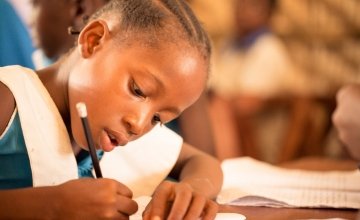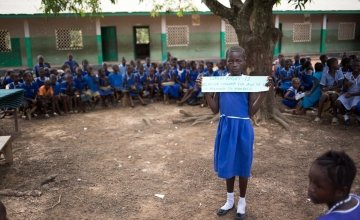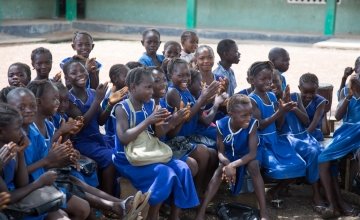
Read our 2023 annual report

Knowledge Hub
Protecting the rights of pregnant girls in Sierra Leone

Being a girl in Sierra Leone comes with enormous insecurity and risks. With one of the highest teenage pregnancy rates in the world, the most significant challenge facing girls is the barrier to education if they become pregnant.
Concern’s National Education Coordinator in Sierra Leone, Amy Folan, looks at the issues around this, and advocates for stronger policies to protect the right to education for all girls — pregnant or not.
Education, Ebola and teenage pregnancies
When the Ebola outbreak occurred in 2014 and 2015, the issue of teenage pregnancy was brought to the forefront of public debate in Sierra Leone.
The prolonged closure of schools gave rise to speculation that the number of pregnancies would increase, thus increasing public pressure on the government to address the issue.
When the President announced in January 2015, that special consideration and educational support was to be given to girls who had become pregnant during the Ebola crisis, hopes were high for ensuring that these girls, many of whom were survivors of assault or abuse, would continue to access formal education - a fundamental human right.
Continuing education for pregnant school girls
However, when the schools reopened in April, it was declared that pregnant girls would not be permitted to attend formal school or sit public examinations while ‘visibly pregnant’.
This stance was galvanised in a document entitled ‘Government Position on Pregnant School Girls’, with the Ministry of Education, Science and Technology (MEST) reaffirming their position to prevent pregnant girls’ access to formal education until after their pregnancy.
This discrimination would massively disrupt the education of pregnant teenagers and prompted a strong reaction from civil society, NGOs, donors, academics and human rights agencies.
As a result of this backlash, there has been some improvement in the opportunities of teenage girls in Sierra Leone.

In October 2015, the Ministry of Education launched an out of school hours education programme for pregnant girls.
This programme follows a condensed version of the formal curriculum being rolled out across the country, hopefully taking a positive step towards increasing the possibility of girls re-entering school after delivery, as per government intentions.
Acknowledging the need for girls to have continued equal access to the formal curriculum and defined pathways back to mainstream schooling provides the opportunity for their futures to not be defined or limited by pregnancy.

Changing the conversation
However, the provision of a parallel system of education for pregnant girls does not address the root causes of high teenage pregnancy rates and doesn’t stem the perpetuation of negative attitudes towards girls.
While it is important to address the public health issues, the violation of education rights and the economic impacts that arise from teenage pregnancy, public discourse also needs to address the root causes that lead to this.
The real problem is the rape and sexual exploitation of girls who have less power in society. We need to change the conversation from blaming girls. We need to stop talking about teenage pregnancy in the abstract. We need to protect our girls from violence. We need to engage men and boys to promote positive masculinities. We need to ensure the minds of girls are valued.
Access to mainstream formal education for ALL children – girls and boys, is one of the keys to ensuring this.


